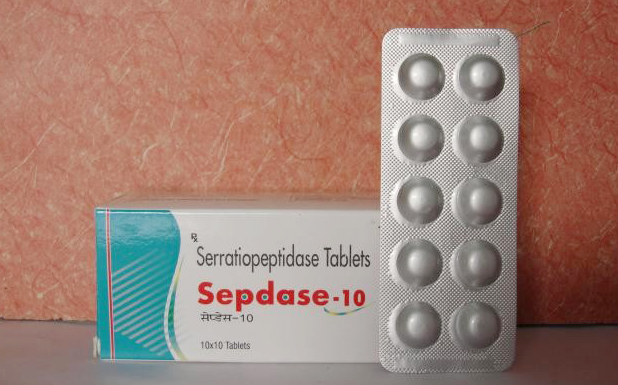Advantage of Using Serratiopeptidase:
Serratiopeptidase is a viable alternative to salicylates, ibuprofen and the more potent NSAIDs. Unlike these drugs, Serratiopeptidase is a naturally occurring, physiological agent with no inhibitory effects on prostaglandins and is devoid of gastrointestinal side effects.
Indications and Usage:
Serratiopeptidase is primarily indicated in conditions like:-
● Haematoma,Inflammation
● Musculoskeletal disorders
● Oedema
● Osteoarthritis
● Rheumatoid arthritis
● Thrombosis
● Traumatic injury
● Can also be given in adjunctive therapy as an alternative drug of choice in Bronchial asthma, Bronchitis, Tuberculosis.
● Super protein-digesting enzyme which breaks down "non living" matter in the human body
Further the uses are elaborated as:
● Powerful anti-inflammatory
● Aids treatment of fibromyaliga, arthritis, rheumatism, multiple sclerosis, etc. Cancer and tumor preventative
● Improving circulation by reducing levels of dead tissue
● Digests scar tissue build up from surgeries or injuries
● Fights build up of fibrin
● Reduces blood clots, cysts, & arterial plaque
● Anti-edemic - prevents swelling and fluid retention
● Has sucessfully treated carpel tunnel
● Shown to help chronic sinusitis sufferers
● Has successfully treated fibrocystic breast disease.
Pharmacology:
Absorption: On oral administration, serratiopeptidase is absorbed in GI tract.
Distribution: Distributed throughout the body tissues, unchanged via systemic circulation. It reaches in higher concentration in inflamed tissues. Serratiopeptidase levels in inflammatory exudates rises gradually with decline in blood levels indicating that serratiopeptidase is quite rapidly transferred to the site of inflammation.
Side Effects:
● Pneumonitis
● Allergic reaction
● Aches and pains
Contraindications:
Hypersensitivity, Coagulation disorder.
High Risk group:
Drug should not be given to Pregnant Mothers, patients suffering from Kidney dysfunction, patients suffering from Liver Malfunction, and Geriatrics.
Warning and Precautions:
Pregnancy and Breast-Feeding:
Not enough is known about the use of serratiopeptidase during pregnancy and breast-feeding. Stay on the safe side and avoid use.
Bleeding Disorders:
Serratiopeptidase might interfere with blood clotting, so some researchers worry that it might make bleeding disorders worse. If you have a bleeding disorder, check with your healthcare provider before using serratiopeptidase.
Surgery:
Serratiopeptidase might interfere with blood clotting. There is a concern that it might increase bleeding during and after surgery. Stop using serratiopeptidase at least 2 weeks before a scheduled surgery.
Storage:
Store Below 30°C. Protect from Sunlight and Moisture.
